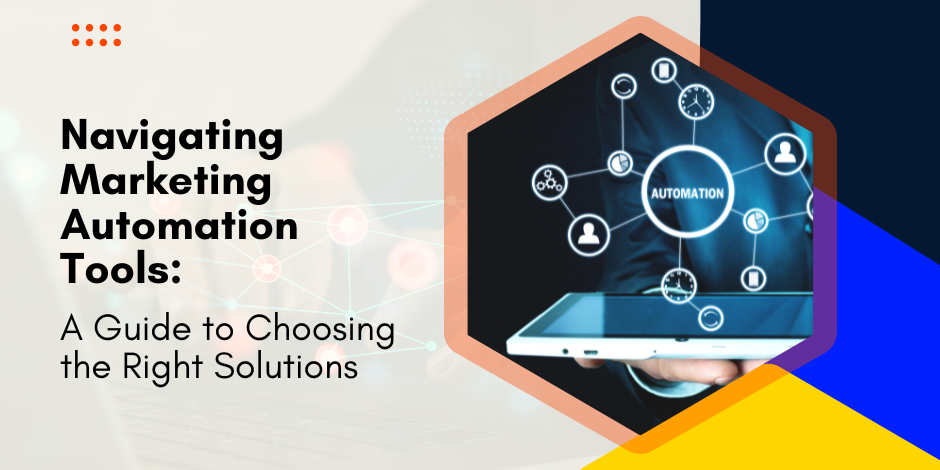Navigating Marketing Automation Tools: A Guide to Choosing the Right Solutions

Stay Informed With Our Weekly Newsletter
Receive crucial updates on the ever-evolving landscape of technology and innovation.
Marketing automation is essential for organizations to streamline their marketing efforts and improve overall efficiency.
With the wide range of marketing automation tools available, choosing the right one for your business can be challenging.
Understanding the basics of marketing automation

Marketing automation is the technology that allows businesses to automate tasks and workflows, such as email campaigns, social media posts, and lead nurturing.
The goal of marketing automation tools is to streamline these processes and improve efficiency, allowing organizations to focus on more strategic activities.
Marketing automation has become crucial in today’s business landscape for several reasons.
Firstly, it enables businesses to personalize their marketing efforts at scale, delivering relevant and targeted messages to their audience.
This personalization can significantly improve customer engagement and conversion rates.
Secondly, marketing automation helps businesses save time and resources by automating repetitive tasks.
This allows marketing teams to concentrate on more important activities, such as strategy development and analysis.
Furthermore, marketing automation tools often include features such as lead scoring, which helps businesses prioritize leads based on their engagement with the brand.
By identifying the most promising leads, organizations can focus on nurturing those relationships, ultimately leading to higher conversion rates.
Additionally, marketing automation platforms provide valuable insights and analytics to help businesses make data-driven decisions.
By tracking key metrics such as open rates, click-through rates, and conversion rates, businesses can refine their marketing strategies for better results.
Identifying your marketing automation needs
Before exploring marketing automation, assessing your business’s marketing needs is essential.
Start by examining your current marketing processes and identifying areas that could benefit from automation.
These could include lead generation, lead nurturing, email marketing, or social media management.
Setting clear goals for your marketing automation strategy is also crucial.
Think about what you want to achieve with automation, such as improving conversion rates, enhancing customer retention, or increasing overall return on investment.
Moreover, conducting a thorough analysis of your target audience can significantly inform your marketing automation decisions.
Understanding your audience’s preferences, behaviors, and pain points can help tailor your automated campaigns to resonate with them effectively.
Customer data and segmentation techniques can further enhance the personalization and relevance of your automated marketing efforts.
Furthermore, it’s important to consider the scalability of your chosen marketing automation platform.
As your business grows, your automation needs may evolve, so selecting a platform that can accommodate future expansions and integrations is key to long-term success in your marketing endeavors.
Exploring different types of marketing automation tools

Several types of automation tools are available to cater to different marketing needs.
Understanding the different options will help you select the most suitable tools for your business.
Email marketing automation
Email marketing automation tools allow organizations to automate their email campaigns, from creating and sending personalized emails to tracking and analyzing performance metrics.
These tools typically offer features like email templates, segmentation, and A/B testing, ensuring that your email marketing campaigns are optimized for success.
Social media marketing automation
Social media marketing automation tools like Hootsuite or Loomly help businesses streamline their social media management.
They enable them to schedule posts, engage with their audience, and analyze social media performance.
These tools often offer features like content calendars, social listening, and social analytics, allowing businesses to manage their social presence effectively.
Content marketing automation
Content marketing automation tools like Zapier are designed to support businesses in creating, distributing, and analyzing content at scale.
These tools often include features like content planning, content creation, content optimization, and content performance tracking.
Businesses can ensure consistency and efficiency in their content strategy by automating key content marketing processes.
Now, let’s dive deeper into the world of marketing automation tools and explore some additional types that can further enhance your marketing efforts.
Customer relationship management (CRM) automation tools
CRM automation tools, like Monday.com, are essential for businesses to streamline their customer relationship management processes.
These tools enable organizations to automate lead generation, customer segmentation, and sales tracking tasks.
With CRM automation tools, organizations can manage customer interactions, improve customer satisfaction, and drive sales growth.
Furthermore, CRM automation tools often integrate with other marketing automation tools, giving businesses a holistic view of customer data and aligning their marketing strategies accordingly.
By harnessing the power of CRM automation, organizations can nurture leads, build strong customer relationships, and ultimately boost their bottom line.
Analytics and reporting automation
In the ever-evolving landscape of digital marketing, data is king.
Analytics and reporting automation tools play a crucial role in helping organizations make data-driven decisions and measure the success of their marketing efforts.
These tools provide businesses with comprehensive insights and visualizations, allowing them to track key performance indicators, monitor campaign effectiveness, and identify areas for enhancement.
With analytics and reporting automation tools, businesses can save valuable time and resources by automating the process of data collection, analysis, and reporting.
By having access to accurate and real-time data, organizations can make better decisions, optimize their marketing strategies, and stay ahead of the competition.
Key features
When choosing a marketing automation solution, consider the key features that will best support your business’s marketing goals.
User-friendly interface
Look for a marketing automation tool with an intuitive and user-friendly interface.
The tool should be easy to navigate and understand, allowing your team to get up to speed and use it effectively quickly.
Integration capabilities
Ensure that the marketing automation tool integrates seamlessly with your existing marketing stack.
It should also be able to integrate with other tools, such as CRM systems, email service providers, and social media platforms, to ensure smooth data flow and maximize automation capabilities.
Reporting and analytics
Any marketing automation tool must have robust reporting and analytics.
The tool should provide actionable insights into your marketing performance, allowing you to track campaign effectiveness, identify areas for enhancement, and make data-driven decisions.
Making the right choice: Factors to consider

Several factors must be considered as you evaluate different marketing automation solutions to ensure you make the right choice for your business.
Pricing and budget considerations
Consider your budget when selecting a marketing automation tool. Pricing structures can vary, so ensure your chosen solution aligns with your budgetary constraints while meeting your marketing needs.
Vendor reputation and customer support
Research the reputation of the marketing automation vendors you are considering. Look for reviews and testimonials to gauge customer satisfaction levels.
Additionally, consider the level of customer support the vendors provide, including access to the help desk, training resources, and ongoing support.
Scalability and future-proofing your investment
Choose a marketing automation tool that can grow with your business.
Consider the solution’s scalability and how well it can accommodate your future marketing needs.
Invest in a tool that provides flexibility and scalability to avoid outgrowing your automation system too quickly.
Conclusion
Whether you’re looking to automate your email marketing, social media management, content creation, customer relationship management, or analytics and reporting, a wide range of marketing automation tools are available to suit your needs.
By leveraging the power of automation, you can streamline your marketing processes, enhance your productivity, and drive meaningful results for your business.
Are you ready to explore where digital marketing mastery can take you in your career?
Are you ready to launch your career in digital marketing?
If so, we encourage you to explore the Institute of Data’s Digital Marketing & Artificial Intelligence Program.
Alternatively, we invite you to book a complimentary call with a member of our team to discuss the Digital Marketing program in more detail.




